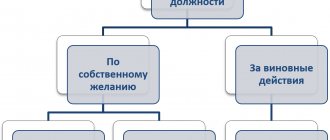New edition of Art. 39 Civil Code of the Russian Federation
1. The guardianship and trusteeship authority shall release the guardian or trustee from the performance of his duties in cases of the return of a minor to his parents or his adoption.
When placing a ward under supervision in an educational organization, medical organization, organization providing social services, or other organization, including an organization for orphans and children left without parental care, the guardianship and trusteeship authority releases the previously appointed guardian or trustee from performance of their duties, if this does not contradict the interests of the ward.
2. A guardian or trustee may be released from performing their duties at their request.
A guardian or trustee may be relieved from performing his duties on the initiative of the guardianship and trusteeship body in the event of conflicts between the interests of the ward and the interests of the guardian or trustee, including temporarily.
Articles on the topic (click to view)
- What to do legally if a mother does not pay child support
- Legal assistance to orphans
- Conditions and documents for obtaining a plot of land for a third child in 2021 in Moscow
- Conditions for receiving and amount of maternity capital for a second child after 2021
- Federal Law 159 on additional guarantees for social support for orphans
- Fixed child support under the new law of 2021 if the father works
- Form of agreement on payment of alimony for a minor child: sample 2021
3. In cases of improper performance by a guardian or trustee of his duties, including when he uses guardianship or trusteeship for personal gain or when leaving a ward without supervision and necessary assistance, the guardianship and trusteeship body may remove the guardian or trustee from the performance of these duties and take the necessary measures to bring the guilty citizen to justice established by law.
What is guardianship
Guardianship, according to Art. 2 of Federal Law No. 48 “On Guardianship and Trusteeship” of August 24, 2008, recognizes the form of family arrangement for persons under fourteen years of age or recognized as incompetent due to mental illness, established by the competent authorities for educational purposes, as well as for the purpose of protecting the rights and interests of the ward .
Within this status, the person entrusted with the duties of a guardian represents the interests of the ward in relations with any entities without any special powers, except when required by law. The responsibilities of a person under guardianship also include living with the ward, ensuring his maintenance, taking care of his comprehensive development, as well as restoring his mental health if his legal capacity has been lost.
Anyone cannot become a guardian. The law requires that this be an adult capable citizen who has no criminal record, has not been deprived of parental rights and has the appropriate financial and property capabilities. By the way, guardianship can also be implemented in the form of a foster family or foster care.
Another comment on Article 39 of the Civil Code of the Russian Federation
1. Paragraph 1 of the commented article defines the grounds upon which guardians (trustees) are relieved of their duties.
The grounds for the release of guardians (trustees) of minors are:
restoration of parents' ability to raise them independently, protect their rights and interests (restoration of parental rights, abolition of their restrictions, recovery of parents, release from prison, etc.);
adoption of a minor;
placement of a minor in an educational or other institution with full state support.
The specified circumstances are not unconditional grounds for the release of the guardian (trustee). In each case, the issue is resolved based on the interests of the ward. Thus, when adopting a child under guardianship (trusteeship), the consent of his guardian (trustee) is required. If the guardian (trustee) refuses, the court, guided by the interests of the child, has the right to make a decision on his adoption without the consent of the guardian (trustee) or to refuse adoption (Article 131 of the Family Code). Temporary placement of a child in an educational, medical or other state children's institution does not terminate the rights and obligations of the guardian (trustee) in relation to this child (Article 147 of the Family Code). The request of a person restored to parental rights to return the child to him must be satisfied by the court only if this is in the interests of the child (Article 72 of the Family Code).
The basis for the release of a guardian of an incapacitated adult may be his placement in a medical institution or in a social welfare institution.
2. A guardian (trustee) may be released from performing duties of guardianship (trusteeship) and at his personal request, motivated by a good reason. The law does not contain an exhaustive list of such reasons. They are determined taking into account the specific circumstances and interests of the ward. In addition to those listed in paragraph 2 of the commented article, valid reasons may include: change in marital status, family composition, new work that is difficult to combine with the duties of a guardian (trustee), frequent and prolonged absence from work, remoteness of place of residence, etc.
This is important to know: Where to start properly filing a divorce from your wife through the court
If the reasons for which the guardian (trustee) refuses to fulfill his duties are not (cannot be recognized as) valid, this may serve as a basis for the removal of the guardian (instead of his release), but the guardianship (trusteeship) relationship is still terminated, since they can no longer be considered normal.
3. To release a guardian (trustee) from performing duties, objective circumstances specified in paragraphs are sufficient. 1 and 2 of the commented article. The presence of his guilt is not required to take this measure. The removal of a guardian (trustee) from his duties, provided for in paragraph 3, is, in essence, a sanction for guilty behavior and entails a number of adverse consequences. Thus, these persons cannot in the future be adoptive parents, guardians (trustees), or adoptive parents of minors (Articles 127, 146, 153 of the Family Code). Guardians (trustees) are removed if they: shied away from fulfilling their duties; abused their rights; used their powers of guardianship (trusteeship) for selfish purposes; left their wards without supervision and necessary assistance.
When making a decision to remove a guardian (trustee), the guardianship and trusteeship body takes measures to compensate for the harm caused to the ward (Article 1022 of the Civil Code). In cases where the ward is left without supervision and necessary assistance and his life and health are in danger, the guardian (trustee) may be brought to criminal liability under Art. 125 of the Criminal Code.
Legislation
The main document regulating guardianship and all accompanying procedures is the Civil Code of the Russian Federation. It introduces guardianship into civil legislation as one of the forms of family structure, regulates general requirements for the personalities of guardians and determines the procedure for establishing guardianship. At the same time, according to Part 3 of Art. 35 of the Civil Code of the Russian Federation, the status of a guardian is given exclusively with the consent of the subject himself to such a burden.
The Family Code of the Russian Federation is no less important. In particular, Art. 145 of the RF IC regulates a number of conditions for establishing guardianship, among which consent to guardianship also appears, but it is necessary on the part of the potential ward who has reached the age of ten. Taking this into account, the right of the ward to refuse his guardian cannot be excluded, even if this is not expressly defined in the law.
In the end, all this was reflected in the basic principles of guardianship enshrined in Art. 5 of the Federal Law “On Guardianship and Trusteeship”, one of which is the freedom to make decisions and the free opportunity to refuse guardianship of a child.
According to paragraph 3 of Art. 29 Federal Law of August 24, 2008, a guardian may be relieved of his functions at his own request. Such release terminates the guardianship and entails corresponding legal consequences.
In addition, the document regulates the procedure for selecting candidates, their legal status and responsibility, rules for managing the property of wards, the powers of guardianship authorities and many other important issues.
Of no less importance is Decree of the Government of the Russian Federation No. 423 of May 18, 2009 and the Rules approved by it, since they specify the requirements of the law and spell out step by step all stages of the procedure for establishing guardianship.
Commentary on Article 39 of the Civil Code of the Russian Federation
1. The commented article is devoted to the termination of guardianship (trusteeship) in connection with the transition to another form of placement of a minor or to guardianship (trusteeship) according to the law (clause 1), as well as termination of the functions of a specific guardian (trustee) (clauses 2, 3 ). Rule para. 1 clause 1 art. 39 concerns the guardianship (trusteeship) of minors. The return of a minor ward to his parents (for example, when restoring their parental rights - Article 72 of the Family Code) or his adoption (Chapter 19 of the Family Code) have legal priority over guardianship (trusteeship) (Clause 1 of Article 124 of the Family Code), and therefore are canceled guardianship (trusteeship), and guardians (trustees) are relieved of their duties. The simultaneous presence of parental care (adoption) and guardianship (trusteeship) is excluded, and therefore guardianship (trusteeship) is terminated in any case.
2. The law is based on the principle of a citizen freely accepting responsibilities for guardianship (trusteeship) and freely refusing these responsibilities. Since guardians (trustees) are appointed only with their consent (clause 3 of article 35 of the Civil Code), they can be released from performing their duties at their request and regardless of the reason for such a request (paragraph 1, clause 2 of article 39 of the Civil Code, art. 5, paragraph 3 of Article 29 of the Law on Guardianship). Adoptive parents acting as guardians (trustees) on the basis of an agreement on a foster family have the right to refuse to fulfill such an agreement if there are valid reasons (illness, change in family or property status, lack of mutual understanding with the child or children, the presence of conflicting relationships between children, etc. - paragraph 1, clause 2, article 153.2 of the SK). At the same time, according to para. 2 p. 2 art. 39 Civil Code and paragraph 4 of Art. 29 of the Law on Guardianship, guardians (trustees) may be released from the performance of their duties at the initiative of the guardianship and trusteeship authority. Their release can be final or temporary, and the initiative must be based on the existing contradictions between the interests of the ward and the guardian (trustee).
3. In paragraph 3 of Art. 39 we are no longer talking about release, but about the removal of guardians (trustees) from performing their duties. This sanction is applied for an offense committed by a guardian (trustee): a) improper performance of the duties assigned to him; b) violation of the rights and legitimate interests of the ward, including the implementation of guardianship (trusteeship) for personal gain or leaving the ward without supervision and necessary assistance; c) a significant violation of the rules established by law or agreement for the protection of the property of the ward and (or) the disposal of his property (clause 5 of Article 29 of the Law on Guardianship). The guardianship and trusteeship authority has the right to initiate the issue of bringing the guardian (trustee) to justice (Article 26 of the Law on Guardianship, Article 5.35 of the Administrative Code, Article 156 of the Criminal Code).
Reasons for refusing guardianship
The legislation does not specify the reasons for refusal of guardianship. Because of this, a person who wishes to make such a refusal is able to motivate it solely by personal internal motives, without the need to justify his position. In practice, the reason for such treatment on the part of the guardian can be anything, including:
- insurmountable disagreements between the guardian and the ward or members of their families;
- nonverbal incompatibility of the subjects of the relationship;
- contradictions between the interests of the guardian and the interests of the ward;
- illness that interferes with the performance of guardianship duties;
- forced relocation to another area, which is contrary to the will or interests of the ward;
- a banal lack of desire to further fulfill one’s duties.
Guardianship is not only a right, but also a burden obliging the guardian. As part of his duties, he must not only protect the rights and interests of the ward in every possible way, but also report to the controlling organizations for the conscientious performance of his duties.
In particular, guardians annually submit reports to supervisory authorities, which reflect all property transactions that affected the property of the ward, but were carried out by the guardian. Therefore, the amount of control exercised also becomes one of the refusal factors for families who no longer want to take care of their children.
But, as we have already found out, the ward also has the right to change the guardian, refusing guardianship from the current adoptive parent. Since this process is not prohibited, but is not regulated by the legislator, the reason for contacting the competent authorities with an application to refuse a guardian may be:
- mutual hostility between the ward and the guardian;
- restoration of the ability to account for one’s actions (for those who have been deprived of legal capacity);
- intra-family contradictions;
- lack of non-verbal communication and contact between the parties;
- the person under guardianship has no further desire to live with adoptive parents;
- systematic violation of the rights of the ward and other reasons that forced the latter to abandon the guardianship.
Violations
Violations may be expressed in the inability or unwillingness to provide moral and spiritual education.
Guardians often fail to raise a child in accordance with generally accepted values. Sometimes they themselves provoke a distorted perception of the correct model of behavior. In addition, violations may be expressed in infringement of the material interests of the child. This may be expressed in the lack of educational supplies, clothing, and so on.
Guardianship for selfish purposes
Methods for depriving guardianship also involve proving the selfish goals of the spouses.
After all, a child may have his own property, the disposal and management of which is assumed by guardians. In addition, they receive benefits from the state and various benefits.
As a result, a significant portion of their income comes from custody payments. But these funds should go for the benefit of the child, and not to satisfy personal interests.
If the selfish motive of the spouses’ actions is proven, then guardianship will be terminated.
Waste of property and finances of the ward
When disposing of a child's property, guardians do not have the right to make transactions that lead to a decrease in such property.
That is, it is not allowed to commit actions to the detriment of the interests of a minor.
This means that wasting a child's assets is a gross violation of the custody agreement.
Waste of property and finances of the ward can be qualified under Art. 159 of the Criminal Code of the Russian Federation as fraudulent.
Prolonged absence and shirking of duties
These situations are equivalent to an actual refusal of guardianship. After all, spouses do not fulfill their duties. And the minor remains without their care and care. In the absence of valid reasons, guardianship is terminated. As a rule, such situations are identified by the trusteeship department.
Lack of proper care, no food, clothing, medicine
If employees of the relevant department identify the absence of the necessary elements for a normal life, they are obliged to remove the child and terminate guardianship. That is why inspections are carried out monthly in the first year. The child himself can report these violations.
Deterioration of health, injuries due to the fault of the caregiver
If the guardian's actions or inactions result in ill health or injury, maintaining guardianship becomes dangerous for the child.
Each such case must be carefully checked.
In some cases, there will be grounds for a procedural check by police officers.
Deterioration of the guardian's health (tuberculosis, alcoholism, 1st degree disability, etc.)
If the guardian, due to lifestyle or health conditions, is unable to fulfill his duties, they are terminated. It is obvious that tuberculosis poses a direct threat to the health of the child. 1st degree disability necessitates the care of the guardian himself. Therefore, guardianship is terminated in any of these cases.
Procedure for registration of refusal
Despite the fact that the procedure for renouncing guardianship is not provided for by law, it includes the need to go through several mandatory stages. These include:
- Contacting the competent authorities.
- Collection and submission of a package of necessary documents.
- Submitting a guardian's report.
- Consideration of the appeal.
- Making a decision and drawing up the relevant act.
To fully understand the situation, we consider it advisable to consider the most significant points in more detail.
Where to contact
According to Art. 29 of the Federal Law “On Guardianship and Trusteeship”, the decision to release persons from their guardianship duties is made by the guardianship authority. Therefore, the appeal must be sent specifically to the guardianship authority at the place of residence of the adoptive family. If there is a conflict between the interests of the ward and the guardian, the decision to terminate guardianship is also made by the guardianship council, so the ward should also contact there.
Required documents
The legislator believes that guardians can be released from their duties as a result of their personal request. It seems that such a request should be expressed in the form of an application submitted to the head of the guardianship authority. The application shall indicate:
- full name of the body to which the appeal is sent;
- personal data of the guardian and the ward, including residential address;
- an indication of the details of the act by which guardianship was established;
- expressing a request for release from guardianship functions;
- substantiation of one’s position, description of life circumstances that impede the further implementation of guardianship functions;
- link to article 29 Federal Law No. 48 of August 24, 2008, defining how to refuse guardianship;
- date and signature.
The law does not provide for specific requirements and rules for filing an application to waive guardianship, but it would be best to submit such a document in person.
View a sample application for relinquishment of guardianship.
Please note that along with the application to the guardianship authority the following must be submitted:
- identification documents of the applicant;
- a copy of the act establishing guardianship;
- the guardian's report, the need to provide which is established by Art. 30 Federal Law “On guardianship and trusteeship”;
- other documents that may be required by representatives of the guardianship authority.
Let us note that if such an appeal is sent by a ward whose interests are a priority, he will most likely only need one application. It seems that such a statement, regardless of the reasons, can be sent even orally.
In accordance with clause 6 of the “Rules for checking the living conditions of wards”, approved by Decree of the Government of the Russian Federation No. 423 of May 18, 2009, the ward’s application should become the basis for an unscheduled inspection of living conditions, as a result of which conflicting interests of the parties may be identified or, for example, restoration legal capacity of a person previously deprived of it. This ultimately leads to the release of the guardian, including temporary release, from performing his duties, or the ward will have to go to court to restore his legal capacity.
Timing and result of consideration
If the decision is made on the basis of an application sent by the guardian, the consideration of the case usually takes no more than three days.
Officials draw up an act according to which guardianship is terminated and the person is released from performing guardianship functions. Legal relations between a guardian and his ward cease from the moment this act is adopted.
If the corresponding request is sent by the ward, it will take a little longer to terminate the relationship. The fact is that in this case the guardianship authorities need to:
- Issue an act on an unscheduled inspection.
- To inspect.
- Within 10 days, draw up a report on the results of its implementation.
- Based on this document (if a positive decision is made), draw up an act on the release of the citizen from guardianship functions.
At the same time, the guardian himself, according to Part 7 of Art. 29 Federal Law “On Guardianship and Trusteeship”, has the right to challenge such a decision
Article 39. Release and removal of guardians and trustees from the performance of their duties
1. The guardianship and trusteeship authority shall release the guardian or trustee from the performance of his duties in cases of the return of a minor to his parents or his adoption.
When placing a ward under supervision in an educational organization, medical organization, organization providing social services, or other organization, including an organization for orphans and children left without parental care, the guardianship and trusteeship authority releases the previously appointed guardian or trustee from performance of their duties, if this does not contradict the interests of the ward.
This is important to know: Divorce in Russia in 2021: procedure, procedure
2. A guardian or trustee may be released from performing their duties at their request.
A guardian or trustee may be relieved from performing his duties on the initiative of the guardianship and trusteeship body in the event of conflicts between the interests of the ward and the interests of the guardian or trustee, including temporarily.
3. In cases of improper performance by a guardian or trustee of his duties, including when he uses guardianship or trusteeship for personal gain or when leaving a ward without supervision and necessary assistance, the guardianship and trusteeship body may remove the guardian or trustee from the performance of these duties and take the necessary measures to bring the guilty citizen to justice established by law.
Judicial order
The law does not provide for a judicial procedure for release from guardianship. The decision-making functions in this regard, as already mentioned, are assigned to the guardianship authorities. The need to apply judicial procedure, in particular, at the request of the guardianship authority, in accordance with Art. 70 of the RF IC, is established only in cases where biological parents are deprived of their parental rights. In this case, the guardianship authority is obliged to file a corresponding petition with the court. But the extension of this norm to guardians is not provided - for them the legislator provided Art. 29 Federal Law No. 48 dated August 24, 2008.
At the same time, the guardian himself, according to Part 7 of Art. 29 of the Federal Law “On Guardianship and Trusteeship”, has the right to challenge the decision to release him from the duties of a guardian. Therefore, judicial procedure can also be applied in cases where supervisory authorities have already decided to release a citizen from guardianship functions, but he exercised his right to appeal. In this case, he files a claim in court at the location of the guardianship authority, since it will be the defendant in this situation.
In addition, a court order to terminate guardianship may be required in cases where termination of guardianship is necessary due to the restoration of the legal capacity of the ward. In this case, a petition to the court, according to Art. 15 of the Federal Law “On Guardianship and Trusteeship”, the guardian himself must submit. The latter's inaction in this matter contradicts the interests of the ward and the law, which requires the guardianship authority to go to court.
Grounds for deprivation of guardianship
At the initiative of the guardian, the status is terminated unconditionally. Release from guardianship occurs upon application of the spouses.
However, the guardianship department may try to convince them to maintain guardianship. But it is impossible to go beyond beliefs.
Guardianship does not imply coercion to perform one's duties. After all, this would be contrary to the interests of the child.
When deprived, we are talking about other circumstances. This may be a change in the lifestyle of spouses who begin to abuse alcohol and stop caring for the child. Consequently, school attendance and behavior deteriorate.
Identification of facts of unfair guardianship is entrusted to the guardianship department. They conduct regular checks and must monitor the spouses' performance of their duties.
Finding missing parents
Such situations are provided for by law. In this case, guardianship is established due to the fact that the whereabouts of the parents are unknown.
This may be due to their departure or other circumstances.
In this case, the missing parents may be recognized by the court as missing or even dead. In any case, the absence of parents means that you need to take care of the child left without care.
Therefore, the guardianship authorities place him in the family of relatives or other persons, drawing up an agreement. If the missing parents are found, then the grounds for establishing guardianship will disappear by themselves. This means that the child must be returned to the parents.
There should be no reason to deprive them of parental rights. That is, the return to parents should not pose a threat to the physical or moral development of the child.
Patient's request
The ward's request can only be considered through representatives of the guardianship department.
After all, he is an incompetent person and cannot independently defend his rights.
To be heard, he needs to contact the guardianship department during the next inspection or at any time to the prosecutor's office. Such a statement will be the basis for a serious audit.
If violations are detected on the part of the guardians, their status will be terminated.
Improper performance of duties
This is a direct violation on the part of the guardians. Their responsibilities are spelled out in detail in the agreement with the guardianship authority.
Accordingly, failure to fulfill any of the obligations will be grounds for termination of such status.
The main responsibilities are to raise the child in the spirit of generally accepted values and ensure that he receives an education. The material side is also important.
Regular checks of the child by guardianship authorities
This body carries out periodic inspections. During such events, living conditions, availability of space for activities, provision of clothing and food are assessed. But in addition to material benefits, communication with a minor is important.
During the conversations, a psychologist or other agency employee finds out living conditions, the nature of relationships with guardians, and existing problems. It is important to identify difficulties in time and take measures to overcome them.
Consequences of refusing guardianship
The general consequences of termination of guardianship are provided for in the provisions of Art. 30 Federal Law “On guardianship and trusteeship”. These include:
- the obligation of a person released from guardianship functions, within three days from the moment he became aware of this, to provide the guardianship authorities with a guardianship report submitted by him earlier annually in accordance with Art. 25 Federal Law “On guardianship and trusteeship”;
- bringing a person to administrative, criminal or other liability at the request of the guardianship authorities, if the results of the inspection reveal violations of the law. The said petition is sent to the competent authorities within a week from the receipt of the report or within two weeks if such grounds are discovered;
- termination of a guardianship agreement previously concluded with a person.
In addition to general legal consequences, there may also be specific consequences depending on the object of guardianship. For a complete understanding, let's look at the most common cases.
Refusal of guardianship of a minor
Guardianship of a young child has a lot of specific features, which is associated with the special nature of state support for children left without the care of biological parents. Therefore, refusal of guardianship of a minor, in addition to general ones, has very specific legal consequences. In particular, according to the “Rules for checking the living conditions of wards”, approved by Decree of the Government of the Russian Federation No. 423 of May 18, 2009, together with drawing up an act on the release of the guardian from his duties, the guardianship authority makes a decision to send the child to another family or organization for orphans .
In addition, guardians are deprived of the right to benefits assigned for the maintenance of the child, compensation payments if the child was disabled, as well as remuneration paid for performing guardianship functions.
Read more about how to obtain child custody.
Refusal of guardianship of the elderly
If guardianship of an elderly person is terminated, all of the general consequences listed above occur. Moreover, if guardianship is carried out over an elderly person who, in accordance with the instructions of a doctor, requires constant care or is a disabled person of the first group, or has reached the age of 80 years, then the guardian, in accordance with Decree of the President of the Russian Federation of February 26, 2013 No. 175, is provided with compensation payments in in the amount of 1200 rubles. From the moment the act of releasing the guardian from his duties is signed, the payment of such compensation ceases.
We recommend that you familiarize yourself with the registration of guardianship over an elderly person in more detail.
Guardianship should not be confused with a life annuity, which can be issued exclusively with legally capable elderly people and is concluded through an agreement, without the participation of the guardianship authorities.
Refusal of guardianship of an incapacitated person
It is also possible to refuse guardianship over an incapacitated person, regardless of the reasons for such incapacity. In this case, the person released from the duties of a guardian no longer has the right to act as a legal representative and enter into transactions on behalf of the incapacitated person. In this case, the execution of already concluded transactions, as well as the conclusion of new contracts, is entrusted to the new guardian, and in his absence, to the guardianship authority. Please note that transactions concluded contrary to the interests of the ward may be declared invalid.
Find out more about how to take guardianship of an incapacitated person.
Article 39. Release and removal of guardians and trustees from the performance of their duties
1. The guardianship and trusteeship authority shall release the guardian or trustee from the performance of his duties in cases of the return of a minor to his parents or his adoption.
When placing a ward under supervision in an educational organization, medical organization, organization providing social services, or other organization, including an organization for orphans and children left without parental care, the guardianship and trusteeship authority releases the previously appointed guardian or trustee from performance of their duties, if this does not contradict the interests of the ward.
2. A guardian or trustee may be released from performing their duties at their request.
A guardian or trustee may be relieved from performing his duties on the initiative of the guardianship and trusteeship body in the event of conflicts between the interests of the ward and the interests of the guardian or trustee, including temporarily.
3. In cases of improper performance by a guardian or trustee of his duties, including when he uses guardianship or trusteeship for personal gain or when leaving a ward without supervision and necessary assistance, the guardianship and trusteeship body may remove the guardian or trustee from the performance of these duties and take the necessary measures to bring the guilty citizen to justice established by law.
Denial of custody
The law provides clear requirements for potential candidates for guardianship, rules for their selection and appointment. However, the right to guardianship is not always granted to citizens. Based on the results of consideration of the application, the guardianship authorities have the right to make a decision both to establish guardianship and to refuse to establish it. The reason for this may be:
- inconsistency of the candidate’s personality with the requirements of Art. 146 RF IC;
- his lack of financial opportunity to raise a child, provide care and protect the interests of other wards;
- non-compliance of the residential premises with the requirements of housing standards;
- the presence of diseases included in the list approved by Decree of the Government of the Russian Federation No. 117 of February 14, 2013;
- non-compliance of submitted documents with established standards, submission of false information and documents;
- the presence of other potential guardians who have priority in obtaining guardianship.
The refusal of guardianship is formalized by the relevant act of the official. It must indicate and justify the reasons for refusing the candidate for guardianship. If the subject considers such a refusal to be unfounded, he has the right to appeal it in court.
The process of deprivation of guardianship by guardianship authorities
If violations are detected, the status must be terminated. The procedure involves a guardianship check. During this process, the available information will be verified. If it is confirmed, the guardianship authority will terminate the guardianship agreement.
Who can start the process?
The beginning of this procedure can be any initiative message. A person who has significant information must transfer it to the prosecutor's office or guardianship authority. And these authorities will begin an investigation and verify the information.
What will you need?
Substantial evidence is required to terminate status. Photos and video materials are accepted as reliable information. If we are talking about causing harm to health, then a medical report is needed. Similar facts can be revealed during a medical examination.








